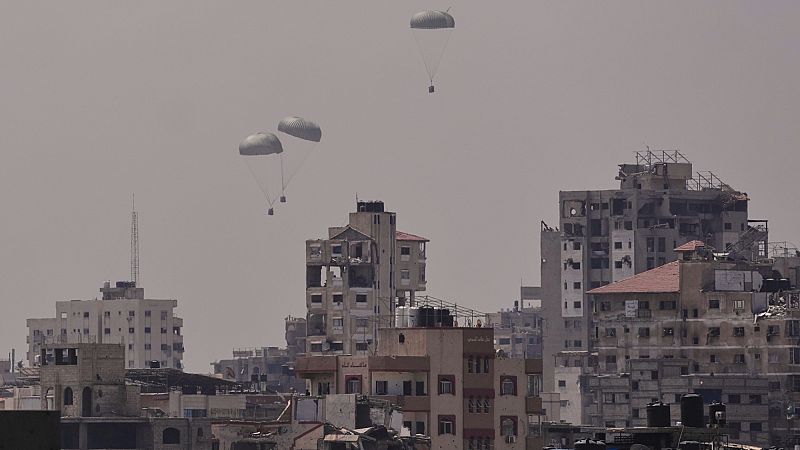European leaders criticise Israel’s Gaza City takeover decision as humanitarian concerns rise

European and world leaders have criticised Israel’s decision to seize control of Gaza City, warning the move risks exacerbating the already catastrophic humanitarian crisis in the Strip, and culminating in Germany’s decision to suspend its exports of weapons that could be used in Gaza.
The Israeli security cabinet approved the controversial plan early Friday, marking a new escalation in the country’s nearly two-year-long war against Hamas.
The announcement from Israeli Prime Minister Benjamin Netanyahu’s office came after hours of debate among senior security officials. The decision to move into Gaza City was made in light of Netanyahu’s earlier suggestions that the military would "take control of all Gaza," but also his claim that Israel had no intention of occupying the Strip permanently.
German Chancellor Friedrich Merz’s decision not to authorise any exports of military equipment that could be used in Gaza "until further notice" marked a break from the Staatsräson, a cornerstone of German foreign policy, which sees Israel's security as intrinsically linked to Germany’s national interest.
"The new military push agreed by the Israeli security cabinet makes it increasingly unclear how these goals are to be achieved,” Merz posted on X. ”The German government will, until further notice, authorise no military equipment exports that can be used in the Gaza Strip.”
Merz added that with Netanyahu’s planned offensive, ”the Israeli government bears even more responsibility than before for ensuring that civilians can be provided with the supplies they need,” and should ”refrain from taking any further steps towards an annexation of the West Bank.”
UK Prime Minister Keir Starmer condemned the Israeli security cabinet's decision in strong terms, stating: “Israel’s decision to further escalate its offensive in Gaza is wrong and we urge it to reconsider immediately.”
“This action will do nothing to bring an end to this conflict or to help secure the release of the hostages. It will only bring more bloodshed,” Starmer said in a statement.
“What we need is a ceasefire, a surge in humanitarian aid, the release of all hostages by Hamas and a negotiated solution.”
Starmer added that Hamas “can play no part in the future of Gaza and must leave as well as disarm.” The UK, he said, is working with allies on a long-term strategy to establish peace in the region “as part of a two-state solution.”
Israel asked to 'reconsider'
The comments were echoed with even more intensity by other European politicians who made clear that the takeover of Gaza would further aggravate the current humanitarian disaster in the strip and that a ceasefire would be the only way to end the ongoing war with Hamas.
Spain’s foreign affairs minister, socialist José Manuel Albares, strongly condemned the decision to take over Gaza, which would "only provoke more destruction and suffering”, he said.
His Dutch counterpart Caspar Veldkamp, a member of the centre-right New Social Contract, called Netanyahu’s plan to take over Gaza a "wrong move”.
“The humanitarian situation is catastrophic and demands immediate improvement,” Veldkamp posted on X. "This decision in no way contributes to this and will also not help to get the hostages home.”
Slovenia's Foreign Minister Tanja Fajon "strongly” condemned the Israeli plans and urged Israel "to halt any intention or attempt to militarily occupy Gaza”.
"Any such attempts would further aggravate the already untenable humanitarian conditions. An immediate and permanent ceasefire is needed," she said.
Finland’s Foreign Minister Elina Valtonen echoed those concerns, stating she was “extremely worried” about the worsening humanitarian conditions in Gaza.
“We hope for an immediate Gaza ceasefire and the immediate release of Israeli hostages,” she said.
A more measured reaction came from European Commission President Ursula von der Leyen, who called on the Israeli government to "reconsider” its decision to expand its military operation in Gaza.
Von der Leyen made clear that the priority was the "release of all hostages, who are being held in inhumane conditions”, give "immediate and unhindered” humanitarian aid to Gaza, and establish a ceasefire.
In turn, European Council President António Costa reacted strongly to Netanyahu's takeover plan, urging the 27-member bloc to take action.
According to Costa, Israel's decision alongside “the illegal expansion of settlements in the West Bank, the massive destruction in Gaza, the blockade of humanitarian aid, and the spread of famine,” is contrary to international law and “violates” the agreement reached by the EU last month to improve the humanitarian situation in Gaza.
"Such a decision must have consequences for EU-Israel relations, to be assessed by the Council," Costa concluded.
US President Donald Trump commented earlier this week that the decision was “really up to Israel” and blamed Hamas for stalling negotiations. "They didn’t really want to make a deal," he said.
UN High Commissioner for Human Rights Volker Türk slammed the move, saying: “The Israeli government’s plan for a complete military takeover of the occupied Gaza Strip must be immediately halted.”
“It runs contrary to the ruling of the International Court of Justice that Israel must bring its occupation to an end as soon as possible, to the realisation of the agreed two-state solution and to the right of Palestinians to self-determination,” he added.
'Declaration of a war crime'
Reactions within Israel were divided. Opposition leader Yair Lapid denounced the government’s plan, saying it went against the advice of military leadership.
"The plan is completely contrary to the position of the military and the defence establishment, without taking into consideration the burnout and the exhaustion of the combat troops," he said.
Chief of the General Staff Lieutenant General Eyal Zamir warned earlier on Thursday that the plan would endanger the lives of the hostages and further stretch the military.
Zamir has repeatedly clashed with the security cabinet in recent days, notably over the Gaza proposal.
Prior to the security cabinet session on Thursday, Netanyahu denied Israel had any intentions of permanently controlling Gaza in its entirety.
"We don't want to keep it. We want to have a security perimeter," the Israeli leader told Fox News. "We don't want to govern it. We don't want to be there as a governing body."
He said that Israel intends to hand over the Strip to a coalition of Arab forces that would govern it.
The announcement comes as humanitarian organisations continue to warn of severe conditions in Gaza, where widespread hunger and displacement are mounting daily.
The ongoing Israel-Hamas war in Gaza has displaced nearly the entire population of Gaza, destroyed over 60% of the enclave’s buildings and infrastructure, and brought most of its 2 million residents to the brink of famine.
The war began when Hamas-led militants attacked southern Israel on 7 October 2023, killing some 1,200 people and taking 251 hostage.
Fifty hostages are still being held, although fewer than half of them are believed to be alive.
Israel’s subsequent offensive resulted in the deaths of over 60,000 Palestinians, according to the Hamas-run Gaza Health Ministry, whose figures do not distinguish between fighters and civilians.
The Israeli military says nearly 900 of its soldiers have died since the start of the war.
Today


